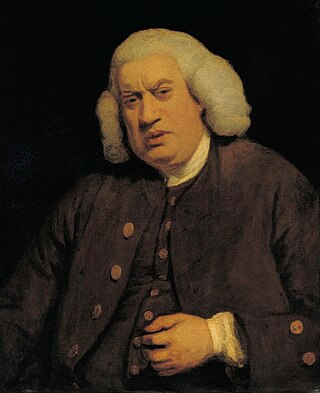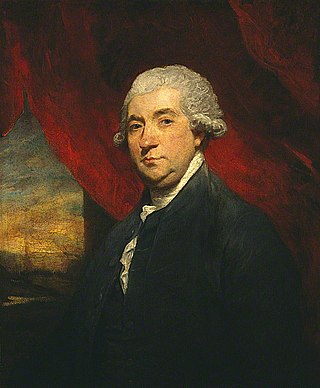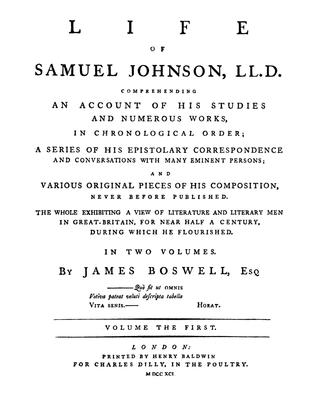Related Research Articles

Samuel Johnson, often called Dr Johnson, was an English writer who made lasting contributions as a poet, playwright, essayist, moralist, literary critic, sermonist, biographer, editor, and lexicographer. The Oxford Dictionary of National Biography calls him "arguably the most distinguished man of letters in English history".

James Boswell, 9th Laird of Auchinleck, was a Scottish biographer, diarist, and lawyer, born in Edinburgh. He is best known for his biography of the English writer Samuel Johnson, Life of Samuel Johnson, which is commonly said to be the greatest biography written in the English language. A great mass of Boswell's diaries, letters, and private papers were recovered from the 1920s to the 1950s, and their publication by Yale University has transformed his reputation.

Hester Lynch Thrale Piozzi was a Welsh writer and socialite who was an important source on Samuel Johnson and 18th-century British life. She belonged to the prominent Salusbury family of Anglo-Welsh landowners, and married firstly a wealthy brewer, Henry Thrale, with whom she had 12 children, then a music teacher, Gabriel Mario Piozzi. Her Anecdotes of the Late Samuel Johnson (1786) and her diary Thraliana, published posthumously in 1942, are the main works for which she is remembered. She also wrote a popular history book, a travel book, and a dictionary. She has been seen as a protofeminist.

George Birkbeck Norman Hill was an English editor and author.

The Life of Samuel Johnson, LL.D. (1791) by James Boswell is a biography of English writer Samuel Johnson. The work was from the beginning a critical and popular success, and represents a landmark in the development of the modern genre of biography. It is notable for its extensive reports of Johnson's conversation. Many have called it the greatest biography written in English, but some modern critics object that the work cannot be considered a proper biography. Boswell's personal acquaintance with his subject began in 1763, when Johnson was 54 years old, and Boswell covered the entirety of Johnson's life by means of additional research. The biography takes many critical liberties with Johnson's life, as Boswell makes various changes to Johnson's quotations and even censors many comments. Nonetheless, the book is valued as both an important source of information on Johnson and his times, as well as an important work of literature.

Auchinleck House is an 18th-century mansion in Scotland. It is situated near the town of Auchinleck near Cumnock and Ayr in East Ayrshire. The Auchinleck Estate has been inhabited since the 13th century, and the remains of Auchinleck Castle and Auchinleck Old House stand in the estate. The house is protected as a category A listed building, while the two ruined dwellings are scheduled monuments.
Martin Martin was a Scottish writer best known for his work A Description of the Western Islands of Scotland. This book is particularly noted for its information on the St Kilda archipelago. Martin's description of St Kilda, which he visited in 1697, had also been published some years earlier as A Late Voyage to St Kilda (1698).

The Club or Literary Club is a London dining club founded in February 1764 by the artist Joshua Reynolds and essayist Samuel Johnson.

A biography, or simply bio, is a detailed description of a person's life. It involves more than just basic facts like education, work, relationships, and death; it portrays a person's experience of these life events. Unlike a profile or curriculum vitae (résumé), a biography presents a subject's life story, highlighting various aspects of their life, including intimate details of experience, and may include an analysis of the subject's personality.

The Journal of a Tour to the Hebrides with Samuel Johnson, LL.D. is a travel journal by Scotsman James Boswell first published in 1785. In 1773, Boswell enticed his English friend Samuel Johnson to accompany him on a tour through the highlands and western islands of Scotland. Johnson was then in his mid-sixties and well known for his literary works and his Dictionary. The two travellers set out from Edinburgh and skirted the eastern and northeastern coasts of Scotland, passing through St Andrews, Aberdeen and Inverness. They then passed into the highlands and spent several weeks on various islands in the Hebrides, including Skye, Coll, and Mull. After a visit to Boswell's estate at Auchinleck, the travellers returned to Edinburgh. Johnson published his Journey to the Western Islands of Scotland on 18 January 1775.

Sir John Hawkins was an English author and friend of Dr Samuel Johnson and Horace Walpole. He was part of Johnson's various clubs but later left The Literary Club after a disagreement with some of Johnson's other friends. His friendship with Johnson continued and he was made one of the executors of Johnson's will.

Francis Barber, born Quashey, was the Jamaican manservant of Samuel Johnson in London from 1752 until Johnson's death in 1784. Johnson made him his residual heir, with £70 a year to be given him by trustees, expressing the wish that he move from London to Lichfield, Staffordshire, Johnson's native city. After Johnson's death, Barber did this, opening a draper's shop and marrying a local woman. Barber was also bequeathed Johnson's books and papers, and a gold watch. In later years he had acted as Johnson's assistant in revising his famous Dictionary of the English Language and other works. Barber was also an important source for James Boswell concerning Johnson's life in the years before Boswell himself knew Johnson.

Bennet Langton was an English writer and a founding member of the Literary Club. He is best known for his close friendship with writer Samuel Johnson and his numerous appearances in James Boswell's book The Life of Samuel Johnson.
The Life of Samuel Johnson or Life of Samuel Johnson, LL. D. was written by John Hawkins in 1787. It was the first full biography of Samuel Johnson—with Thomas Tyers's A Biographical Sketch of Dr Samuel Johnson being the first short postmortem biography. Hawkins was a friend of Johnson's, but many in Johnson's circle did not like him. After Johnson's death, Hawkins was approached to produce a biography of Johnson and an edition of his works. His biography described Johnson's life, including previously unknown details about his writing career, but it was plagued by digressions into unrelated topics. Hawkins's Life of Samuel Johnson came under swift attack from critics, friends of Johnson's, and his literary rival, James Boswell immediately after its publication. Many of the critics attacked Hawkins for his lack of a strict focus on Johnson's life or for his unfavourable depiction of Johnson in various circumstances.
Samuel Johnson, a British intellectual, wrote dozens of essays that defined his views on the politics of his time.
Mary Jones was an English poet.
William Johnson Temple (1739–1796) was an English cleric and essayist, now remembered as a correspondent of James Boswell.

An Account of Corsica is the earliest piece of writing related to the Grand Tour literature that was written by the Scottish author James Boswell. Its first and second editions were published in 1768, with a third edition within twelve months. The full title given to the journal is An account of Corsica, the journal of a tour to that island and memoirs of Pascal Paoli.

James Boswell the Younger was a barrister-at-law. He was the second surviving son of Samuel Johnson's biographer James Boswell.
References
- James Boswell (ed. R.W. Chapman), Life of Johnson, Oxford world's classics (Oxford University Press) 3rd edition, 1998, ISBN 0-19-283531-9, p. 496
- E. L. McAdam, Jr., "Dr. Johnson's Law Lectures for Chambers: An Addition to the Canon", The Review of English Studies, Vol. 15, No. 60 (Oct., 1939), pp. 385–391